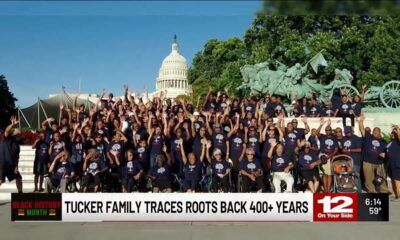Mississippi Today
Mississippi PERS Board endorses plan decreasing pension benefits for new hires


New hires by state and by local governments would receive less benefits upon retirement under recommendations approved Wednesday by the 10-member board that governs the Mississippi Public Employees Retirement System.
Lee County Chancery Clerk Bill Benson, a member of the board, said during the meeting he did not support all aspects of proposed changes in the plan for new hires, but said he would endorse the changes to ensure that current retirees and current public government employees receive the benefits they were promised.
The recommendation endorsed by the board on Wednesday would not change any of benefits for current employees and retirees. The new proposal is similar to recommendations the board made last year, but state lawmakers did not adopt.
The ultimate decision on whether to create a tier 5 that would entail a different and smaller benefits package for new employees rests with the Legislature. On Wednesday the PERS board simply endorsed creating a tier 5.
The hope is that a tier 5 for new employees would address the financial woes many people say exist for PERS, which currently is providing some type of retirement benefits for about 350,000 current public employees and retirees.
The recommendation made by the board would not include a guaranteed cost of living adjustment. The current plan includes an annual 3% cost of living increase that many members take at the end of the year as a so-called 13th check. Some PERS Board members said they do not think it is financially viable to continue the current COLA for new employees.
“A guaranteed COLA is the big elephant in the room,” Benson told fellow board members Wednesday. “… I will support (a new play for new hires) based on that, we need to sustain what was promised to existing employees.”
Benson and others at the meeting said reducing benefits for new hires would help stabilize the system long-term, but noted the system will still need more funding in the meantime.
The key elements in the recommendations the board approved Wednesday with one dissenting vote and one not voting is creating a hybrid plan where a portion of the pension benefits for the new hires would be through a guaranteed defined benefit plan while the other portion would be through some type of investment package, such as a 401K, where the benefits would be determined by investment earnings.
Under the current plan, all of the benefits are guaranteed each month. Board member Randy McCoy who voted no said he could not support changing the program so that all of the month benefit was not guaranteed.
Under an example presented to the board Wednesday, a current employee with 30 years of service earning $60,000 per year at retirement would, based on projections, earn 87% of his or her current work salary upon retirement, including federal Social Security payments. Importantly, those benefits would increase 3% annually based on the guaranteed COLA.
By contrast, the same retiree under the PERS board recommendation would receive 84.1% if the earnings from the investment portion of the pension package increased by 7% annually. But there would be no guaranteed COLA, though, a cost of living increase could be awarded each year.
Some members conceded that a less attractive pension package could make it difficult to recruit people to work in the public sector where the salaries are often less than those provided in the private sector.
Kelly Riley, director of Mississippi Professional Educators, said her group is concerned about the proposal for new hires, “especially its impact on the teacher pipeline and recruitment and retention.”
“We believe it will only deepen and exacerbate our state’s teacher shortage,” Riley said. “New teachers under this tier 5 would contribute the same 9% as those in tier 4, but rould receive fewer guaranteed benefits.”
The financial issues facing PERS have been an ongoing headache for the Legislature with widespread and long-term ramifications. The system has about 350,000 members including current public employees and former employees and retirees. The system provides pension benefits for most Mississippi public employees on the state and local government levels, including schoolteachers. Members of PERS comprise more than 10% of the state’s population.
The system has assets of about $32 billion, but debt of about $25 billion.
During the 2024 session, legislation was passed to strip a key power of the PERS’ Board – to set the percentage of the employee paycheck governmental entities contribute to the pension program.
To deal with long-term financial issues, the PERS Board had planned a 5% increase over three years to 22.4% that the employers or governmental entities contributed to each paycheck. Governmental entities, particularly local governments and school districts, said to pay for the increase they would be forced to reduce services and lay off employees.
While stripping the power from the PERS Board to set the employer contribution rate, the Legislature also enacted a 2.5% increase over five years instead of the 5% increase over three years planned by the PERS Board.
In addition, the Legislature provided a one-time infusion of $110 million into the system.
The board on Wednesday debated holding off on endorsing the recommendation.
“I just got this around 8 last night and I don’t see the rush for us to recommend something,” said board member state Treasurer David McRae. “… I want to get this right. This is going to be a generational change for Mississippi.”
Board Chairman George Dales, former longtime state insurance commissioner, said the Legislature “could still do this on their own” without a PERS board recommendation. Others noted a recommendation from the board would be helpful and politically pragmatic for the Legislature.
State Sen. Daniel Sparks, R-Belmont, a board member, said that even if the state were to adopt more limited benefits, local governments in the system could still provide more, at their own cost.
This article first appeared on Mississippi Today and is republished here under a Creative Commons license.![]()
Mississippi Today
On this day in 1955

March 2, 1955

Nine months before Rosa Parks, 15-year-old Claudette Colvin refused to give up her seat to a white passenger on a city bus in Montgomery, Alabama.
“History had me glued to the seat,” the civil rights pioneer told the Guardian. “It felt as if Harriet Tubman’s hand was pushing me down on the one shoulder, and Sojourner Truth’s hand was pushing me down on the other. Learning about those two women gave me the courage to remain seated that day.”
She aspired to become a civil rights lawyer and when the bus driver ordered her to move, she responded, “It’s my constitutional right to sit here as much as that lady. I paid my fare.”
When two white police officers tried to drag her from the bus, she told them it was her constitutional right to stay. They handcuffed her, jailed her and charged her with violating segregation laws, disturbing the peace and assaulting a police officer. She learned of racism at a young age, and she was disturbed by what she heard in her all-Black school.
“One thing especially bothered me – we Black students constantly put ourselves down,” she said in “Twice Toward Justice.”
“The N-word – we were saying it to each other, to ourselves. I’d hear that word and I would start crying. I wouldn’t let people use it around me.”
After her arrest, she grew close with Parks. Other Black women followed her lead, refusing to surrender their seats, including Mary Louise Smith, Aurelia Browder and Susie McDonald. They brought the groundbreaking Browder v. Gayle lawsuit that resulted in Montgomery’s segregated bus system being declared unconstitutional.
“When it comes to justice, there is no easy way to get it,” she said. “You can’t sugarcoat it. You have to take a stand and say, ‘This is not right.’”
This article first appeared on Mississippi Today and is republished here under a Creative Commons license.![]()
Mississippi Today
Judge’s ruling gives Legislature permission to meet behind closed doors

Hinds County Chancellor Dewayne Thomas recently affirmed the ruling of the Mississippi Ethics Commission that the state Legislature is not covered by the open meetings law and thus can meet behind closed doors.
The Mississippi Open Meetings Act says specifically that all “policy making bodies” are subject to the law. But Thomas and the Ethics Commission majority said the law is referring to executive bodies, not the Legislature, when referencing policy making bodies.
Taking that ruling to the extreme begs the question of whether city councils and city boards of aldermen meetings are covered since they also are legislative bodies.
To exclude the Mississippi Legislature from the requirement of meeting in public seems questionable considering that the Legislature appropriates more public money than any entity in the state. And the Legislature is the state’s primary policy making body with immense power.
It also is worth noting that both the current and past director of the Ethics Commission disagreed with the ruling of the majority of the commission members. The former lead attorney for the Mississippi House, previously on the Ethics Commission, also opposed the ruling that the Legislature is not covered by the open meetings law.
This perplexing issue came to the forefront because of the House leadership’s ongoing practice of holding closed-door Republican caucus meetings where policy is discussed and unofficial votes are taken. It was argued that the meetings were illegal since Republicans comprise a super majority giving them many more members than needed to constitute a quorum.
The Ethics Commission made the ruling in 2022 that the Legislature was not subject to the open meetings law and Thomas, a former member of the House, upheld that ruling.
Senate Republicans, who also have a super majority, do not hold similar meetings because of the belief that it would be a violation of the open meetings law. When Phil Bryant presided over the Senate as lieutenant governor from 2008 until 2012, he was holding similar meetings until media members asked if the meetings were a violation of the open meetings law. He announced he would no longer hold the closed-door meetings.
The Mississippi Constitution does state emphatically, “The doors of each house (of the Legislature) when in session shall be kept open.”
Many of those who would argue that the Legislature is not covered by the open meetings law claim that the constitutional provision only applies to the limited time when a chamber gavels in and does not even cover the time when the Legislature is in session but not gaveled in. If a majority meets during the 90-day session at the speaker’s discretion to discuss business but does not specifically gavel into session, the constitutional provision would not apply, they claim.
Before the 2000 session of the Mississippi Legislature, then-Speaker Tim Ford called a meeting of the House members at a location away from the Capitol.
There was intense interest in the meeting since on the quickly approaching first day of the 2000 session the House would select the state’s next governor.
For the first time in the history of the state, the losing gubernatorial candidate was asking House members to decide the gubernatorial election under an antiquated and now repealed provision of the Mississippi Constitution. The provision said to win statewide office a candidate had to claim a majority of the popular votes and win the most votes in a majority of the 122 House districts. Democrat Ronnie Musgrove won the most votes, but did not win a majority.
Needless to say, Ford’s out-of-session meeting before that historic first-day vote generated interest. Under the ruling of the Ethics Commission and Thomas, the meeting would not have been subject to the open meetings law.
Ford allowed media to attend the meeting. The issue of whether the meeting was public did not arise.
It is difficult to recall an instance when Ford or other past speakers routinely held meetings of a majority of the House behind closed doors to discuss official business and to take unofficial votes.
In those days, there were legislative whips designated by the leadership to meet with small groups to discuss policy and to try to sway votes.
Sure, it took more work than just getting all your members together behind closed doors. But it also did not violate at least the spirit of the open meetings law.
After the Ethics Commission ruling in 2022, Sen. Jason Barrett, R-Brookhaven, filed a bill to clarify that the Legislature is covered by the open meetings law. The bill had 19 co-sponsors in the 52-member Senate. But it died in committee.
Perhaps such a bill will be considered again after Thomas’ most recent ruling.
This article first appeared on Mississippi Today and is republished here under a Creative Commons license.![]()
Mississippi Today
On this day in 1956

March 1, 1956

The University of Alabama expelled Autherine Lucy, the first Black student ever admitted. Thousands of students rioted.
Lucy charged in court that university officials had been complicit in allowing the disorder, as a means of avoiding compliance with the court order. The trustees expelled her for making such “outrageous, false and baseless accusations.”
In 1980, the university overturned her expulsion, and a dozen years later, she earned a master’s degree in elementary education at the university, which endowed a scholarship in her name. The institution also hung a portrait with this inscription: “Her initiative and courage won the right for students of all races to attend the university.”
When the university honored her with a monument in 2019, she looked at the huge gathering and said, “The last time I saw a crowd like this, I didn’t know what they were waiting for.”
She told the students, “If you don’t know your history, you will forget your past.” She recalled the hate she was showered with when she enrolled and the scripture that gave her strength: “The Lord is with me; I will not fear: What can man do to me?”
This article first appeared on Mississippi Today and is republished here under a Creative Commons license.![]()
-

 News from the South - West Virginia News Feed7 days ago
News from the South - West Virginia News Feed7 days ago‘What’s next?’: West Virginia native loses dream job during National Park Service terminations
-

 News from the South - Virginia News Feed3 days ago
News from the South - Virginia News Feed3 days agoVirginia woman getting ready to celebrate 100th birthday: 'I have really enjoyed life'
-

 News from the South - Arkansas News Feed6 days ago
News from the South - Arkansas News Feed6 days agoFederal actions threaten Arkansans’ employment, more job cuts expected
-

 News from the South - Missouri News Feed5 days ago
News from the South - Missouri News Feed5 days agoSt. Peters HOA spends thousands suing homeowners for their fences
-

 News from the South - Virginia News Feed6 days ago
News from the South - Virginia News Feed6 days agoTucker family traces roots back for over 400 years
-

 News from the South - North Carolina News Feed5 days ago
News from the South - North Carolina News Feed5 days agoDays after woman, 2 children stabbed to death, Fayetteville community still in shock
-

 Mississippi Today4 days ago
Mississippi Today4 days agoSenate passes redistricting that puts DeSoto Republican, Tunica Democrat in same district, calls for 10 new elections
-

 News from the South - Tennessee News Feed6 days ago
News from the South - Tennessee News Feed6 days agoHemp industry fears slate of restrictive bills could gut industry















































